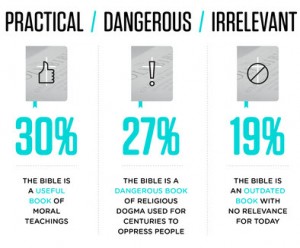 Barna Group recently released findings from the largest survey it has ever done on a single generation’s view of the Bible. Christian Millennials’ (those born between 1984 and 2002) views of the Bible vary considerably from those of non-Christian Millennials.
Barna Group recently released findings from the largest survey it has ever done on a single generation’s view of the Bible. Christian Millennials’ (those born between 1984 and 2002) views of the Bible vary considerably from those of non-Christian Millennials.
Among so-called practicing Christian Millennials
- 96% believe the Bible contains everything a person needs to know to live a meaningful life,
- 85% believe the Bible is the literal word of God or is divinely inspired with no errors but contains some verses that are symbolic rather than literal (46% and 39% respectively for these perspectives), and
- 39% of those in this group that believe in absolute moral truth turn to the Bible as the main source from which they have learned or discovered absolute moral truths and standards.
Among non-Christian Millennials
- 62% have never read the Bible,
- 45% believe the Bible is just another book of teachings written by men that contains stories and advice (a view held by just 11% of the so-called practicing Christian Millennials), and
- 27% understand the Bible as a dangerous book of religious dogma used for centuries to oppress people.
So What?
Some difference in the views of the Bible held by Christian and non-Christian Millennials’ is expected. The Barna piece summarizes each group as follows:
- so-called practicing Christian Millennials have a high view of the Bible, while
- non-Christian Millennials hold ambivalent and sometimes extremely negative views.
In reviewing the data available, I find the non-Christian Millennial views to be refreshingly authentic expressions. For example, their top three descriptive words for the Bible are
- 50% – story,
- 38% – mythology,
- 36% – symbolic.
Those three terms are also part of the shared language of progressive Christianity. They are terms I am used to both saying and hearing in church when describing the Bible. Perhaps these words can be bridge builders for those of us who follow the Way of Jesus and happen to be chronologically older than Millennials as we seek to begin our conversations with Millennials in our quest for mutual enrichment.
- What data point from this new Barna research was most surprising to you (or what finding was least consistent with your expectations)?
- How well represented are Millennials in your faith community?
- When non-Christian Millennials see someone reading the Bible in public, they assume the Bible reader is politically conservative (22%); that they don’t have anything in common with the person (21%); and that the Bible reader is old fashioned (17%). How might you help to counter these assumptions?